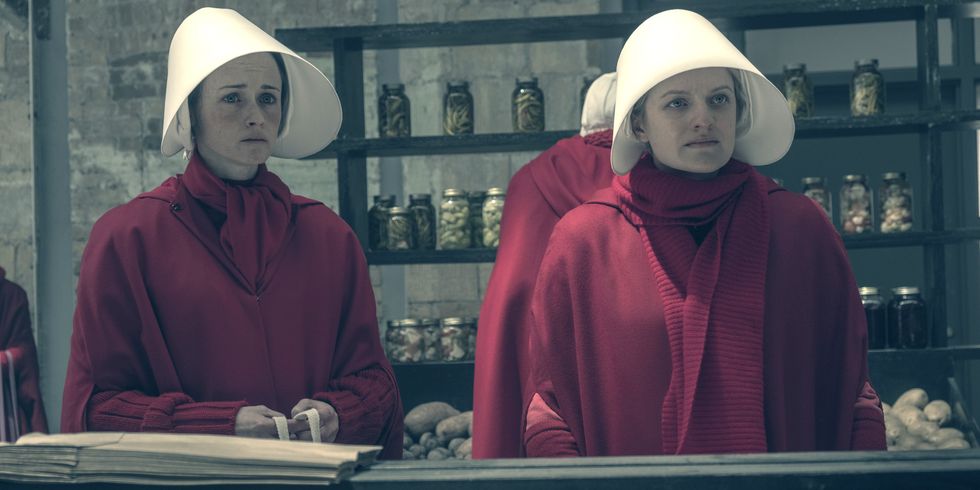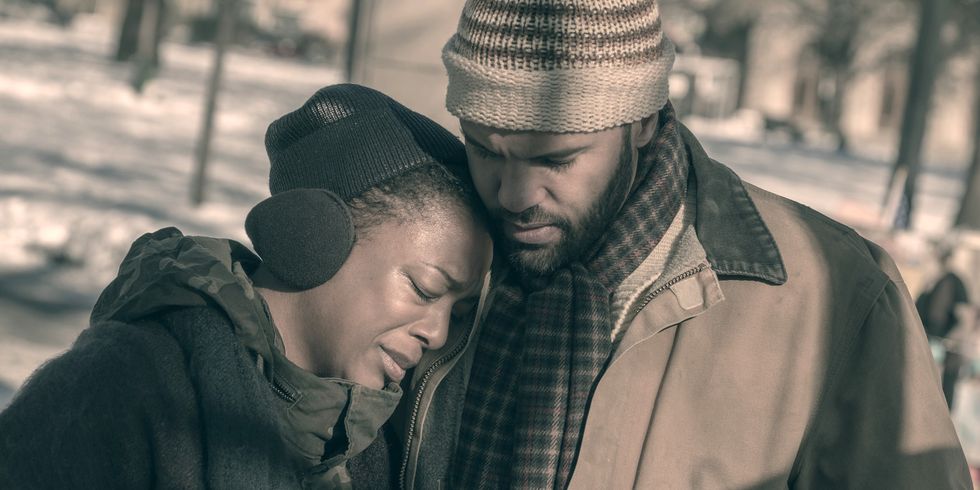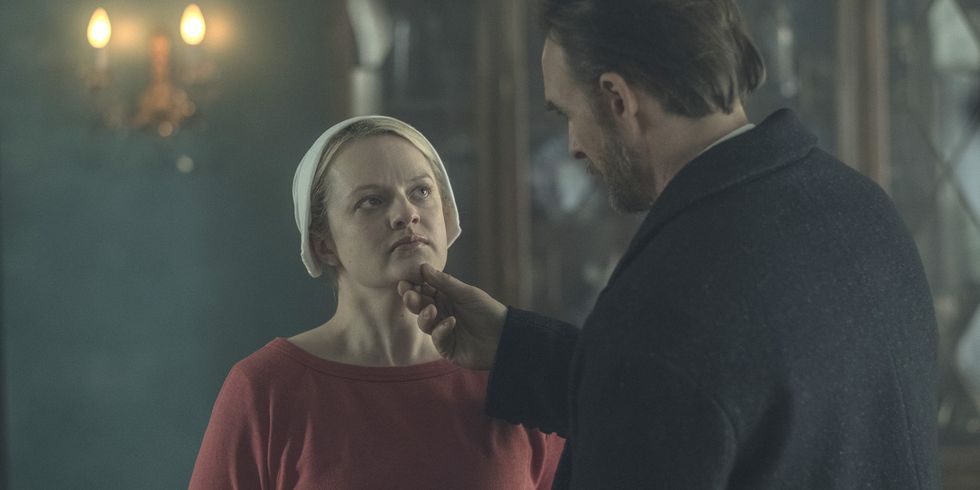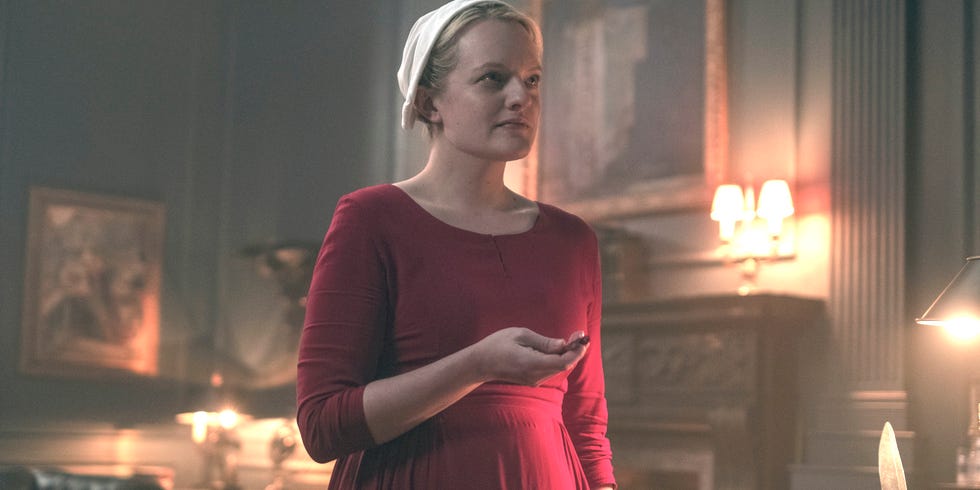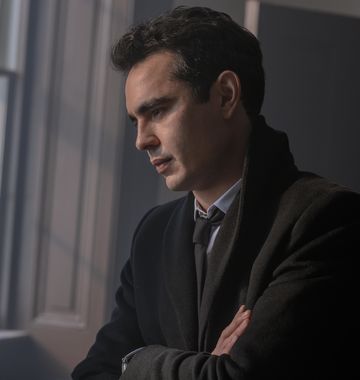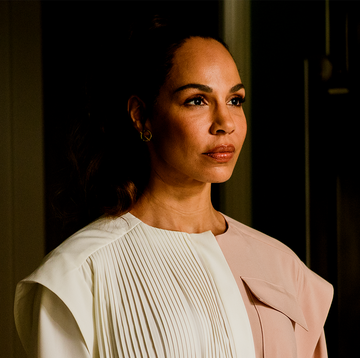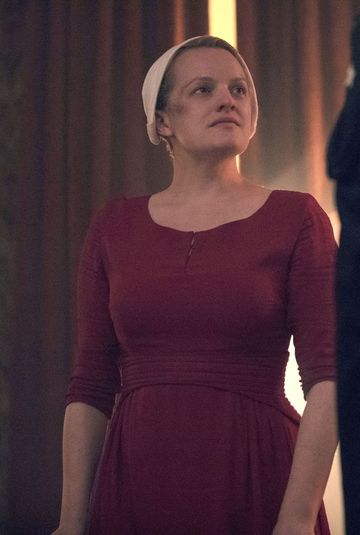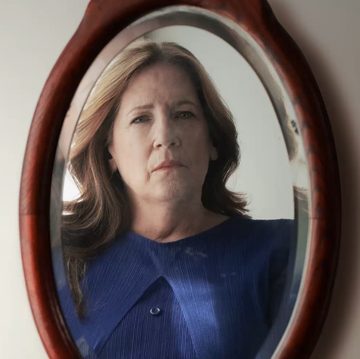After the litany of miseries that has been The Handmaid’s Tale’s second season, this week’s episode, titled "After," offered the first glimmer of hope in a very long time. That’s not to say things are exactly light: we open on a visually lush funeral for the 31 Handmaids who died in the bombing of the new Red Center last week—but swiftly learn the tragedy has a number of silver linings. Here are five talking points from this week’s episode.
1) Ofglen’s suicide bombing proves an unintended lifesaver for two main characters.
I naively thought that since the Handmaids all seemed to be outside the "Rachel and Leah Center" when Ofglen detonated the bomb, they would survive the explosion. But in fact, 31 were killed, as well as 26 commanders—and yet Fred goddamn Waterford is still breathing like the indestructible cockroach he is. The death toll presents an immediate problem for Gilead since Handmaids—or more accurately, their working ovaries—are a rare and precious commodity.
And so a terrified Emily and Janine are Tasered into a van and pulled out of the Colonies, sent back to Gilead because in the end, their fertility trumps their crimes. This is a great development because A) there are really only so many stories you can tell in the Colonies without veering into misery porn, and B) Emily now has to grapple with her actions in the Colonies. She never expected to make it out alive, which made it easier for her to give into her pure rage and kill the Wife back in Episode 2. But now, she has to figure out how to live in the world again, albeit a sick shell of the world.
For right now, Emily and Janine’s return leads into a lovely and life-affirming scene at the grocery store, which recalls June and Emily’s first unexpected moment of connection in the pilot. “June. That’s my name. I never got the chance to tell you,” June says, both she and Emily barely holding back tears at their reunion. This sparks a gradual wave of name-sharing among the Handmaids, as they briefly reclaim the identities they’ve lost. It’s bittersweet in the same way as June getting all those letters from Handmaids across the country last season.
2) Moira had a baby before Gilead.
I’m 99% sure we did not know this about her until now, and it sheds a lot of light on how Gilead decided who would become Handmaids, since fertility-testing every single woman of childbearing age doesn’t seem practical. June, Moira, and Emily all had children before Gilead; back when Emily and Sylvia were trying to escape in this season's Episode 2, the border agent demanded to know whether their son was born of Emily’s egg or an implant. Since it was the former, she became a Handmaid even though she’s also a “gender traitor.”
So, several years ago, Moira agreed to be a surrogate for a British couple in exchange for $250,000. (FYI: the real-world compensation is substantially lower, not that I Googled it.) Since Moira is single at the time, June goes with her to all her scans and pre-natal appointments, and those scenes remind me how much I’ve missed seeing their friendship.
3) We meet Moira’s fiancee Odette for the first time.
The surrogacy isn’t even the main focus of Moira’s storyline. Though she's featured heavily in flashbacks before, it’s always been as an accessory to June’s story until now, and thus, her storyline here feels a little abrupt and rushed to me. Her fiancee Odette (Rebecca Rittenhouse) has never appeared before and has only been mentioned in passing maybe twice, but suddenly here she is, and here is how they met, and here is Moira mourning her death! Samira Wiley is so devastating to watch in that moment that it works, but this episode seemed to be trying to cover way too much emotional ground with Moira in a too-small period of time.
After the news of the terrorist attack, Moira is terrified for June, while Luke seems strangely unaffected. “You don’t want to know if she’s okay?” Moira asks, to which Luke responds, reasonably: “She’s not okay.” The embassy is packed with worried relatives trying to get information about who died in the explosion, but Moira wants to know what happened to Odette, who was rounded up before the war. It’s not completely clear why she was killed, rather than becoming a Handmaid—she’s both a doctor and a gender traitor, two categories of people we know Gilead executed en masse, but presumably she was also infertile? Or is it really the case that you actually needed to carry a pregnancy to term before becoming a Handmaid?
In any case, Moira is led into a room where the unidentified dead are kept on file, and thumbs through a folder of photographs until she finally finds Odette. “I just want to know if she was alone when she died,” she says, and by the looks of the photograph, she was. Moira and Odette only have two scenes together in the episode; Odette was her doctor during the pregnancy, and after the baby was born, they shared a more traditional meet-cute at a Christmas market. Their interaction is really charming, but there’s still nowhere near enough buildup before the devastating blow of her death confirmed. (Side note: I know it’s reductive to want two gay characters to get together purely because they’re gay, but I keep wondering what a Moira/Emily interaction would look like. It’s fine, I’ll just be over here writing fanfic.)
4) Fred is not popular among his colleagues.
We’ve seen hints of this for several episodes: the other commanders seemed skeptical that Fred could deliver on the Red Center project, and Commander Price was extremely receptive to Nick’s low-key aspersions against Fred last week. Price died in the explosion, which briefly makes it look as though Nick’s scheme against Fred may be dead—until Commander Cushing shows up with his own plans to oust Fred.
Cushing is the man tasked with restoring order after the “terrorist attack,” and he has his eye on the Waterford house. He makes a very unsettling visit to question June about her escape, demanding to know who helped her. He's not buying the official line that she was kidnapped against her will, no matter how much she repeats it. “If your house has been infected with terrorists, I need to know,” he says, asking specifically whether Waterford helped her to escape.
Cushing's reign of terror turns Gilead into even more of a nightmarish police state than it was before: guardians now patrol the streets with guns and shoot before asking questions—the neighbors’ Martha is shot dead while fumbling for her ID in the street. Everyone, even the privileged, is afraid. “Guardians shooting Marthas in the street and that’s supposed to make us feel safe?” Serena says. “It’s asinine.” That’s one word for it, sure!
5) Serena has finally maneuvered her way into power—and she’s bringing June with her.
As ever, the relationship between these two is absolutely gripping and impossible to pin down. When June tells Serena that “the baby needs Twinkies,” you can see Serena suppressing the ghost of a smile. So many of their exchanges are coded: “He’s very strong,” Serena says of Fred, which is a fascinating choice of words after she so memorably castigated Fred for his weakness. And it’s in this scene that June confides in Serena about Cushing, and Serena (with Fred still in the hospital) is finally in a position to take some real action to protect her household.
She asks Nick to walk her through the process of submitting warrants to the Consular of Divine Law, smoothly telling him: “I know the commander will forgive my trespasses.” Nick’s not about to argue. Serena forges Fred’s signature, and Nick delivers the documents, and a day later Cushing is whisked away into a black van, accused of being a traitor. “The evidence submitted by the Eyes is overwhelming,” he’s told, as Serena watches with a steely gaze from the house, and June watches too, seeing Serena in a whole new light.
After the glimmer of light that is the Handmaids exchanging names, June and Serena share one last scene together in which they truly join forces. Having now effectively taken over Fred’s duties, Serena is drafting new security orders to replace Cushing, and she asks for June’s help with the language. “You’re an editor, aren’t you?” she confirms, and June can barely comprehend the question; it’s been so long since she thought of herself as this. Serena wrote a book, and while every writer absolutely needs a good editor, there’s no actual reason why she needs June to look over this language. She’s very deliberately bringing June in on her quiet usurping of Fred, and in her quiet undermining of the misogynistic society she helped to build. Only in this show could the act of clicking a pen feel so revolutionary.

